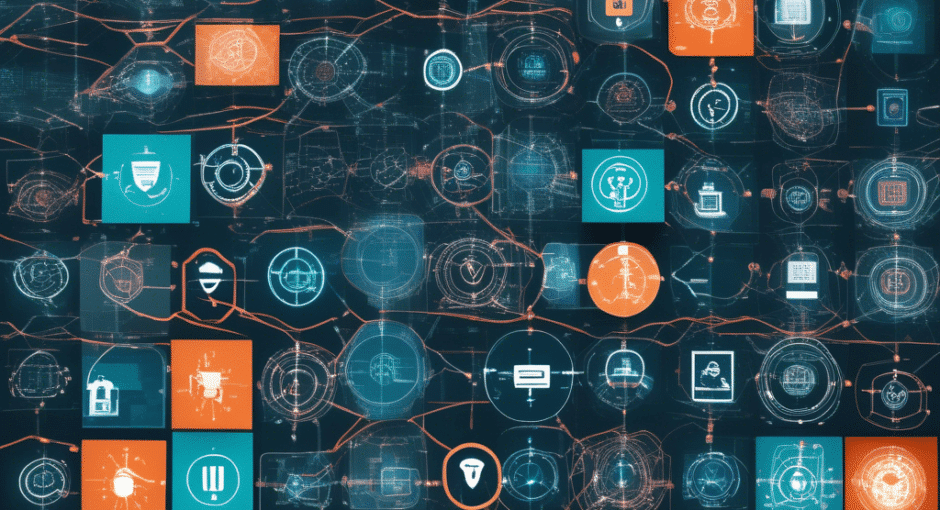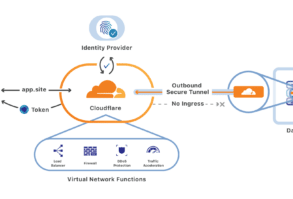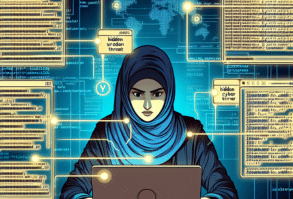Welcome to the digital age, where cybersecurity is more important than ever before. With the increasing reliance on technology and the constant threat of cyber attacks, it has become crucial for individuals to take proactive measures in protecting their digital lives. In this article, we will explore the essential daily tips to safeguard your online presence and ensure your digital security remains intact.
Section 1, titled "Cybersecurity 101: Essential Daily Tips to Protect Your Digital Life," will delve into the fundamental practices and strategies that every individual should adopt to stay ahead of cyber threats. From creating strong, unique passwords to regularly updating software and applications, these tips will serve as the building blocks of a robust cybersecurity defense.
Moving on to Section 2, "End User Security: Empowering Individuals with Cybersecurity Best Practices," we will explore the role that individuals play in strengthening the overall cybersecurity landscape. By understanding common attack vectors, practicing safe browsing habits, and identifying phishing attempts, individuals can become active participants in their own digital security.
Finally, in Section 3, "The Importance of Cybersecurity Education: Building a Safer Online World," we will emphasize the significance of cybersecurity education in today’s interconnected world. By promoting awareness, educating individuals on potential risks, and encouraging responsible digital behavior, we can collectively create a safer online environment for everyone.
Whether you are a college student, a working professional, or someone simply looking to enhance your cybersecurity knowledge, this article aims to provide valuable insights and practical tips to fortify your digital life. Join us as we embark on this journey to empower ourselves and build a safer and more secure online world.
- 1. "Cybersecurity 101: Essential Daily Tips to Protect Your Digital Life"
- 2. "End User Security: Empowering Individuals with Cybersecurity Best Practices"
- 3. "The Importance of Cybersecurity Education: Building a Safer Online World"
1. "Cybersecurity 101: Essential Daily Tips to Protect Your Digital Life"
In today’s digital age, cybersecurity has become more important than ever. With cyber threats becoming increasingly sophisticated, it is crucial for individuals to take proactive steps to protect their digital lives. By following some essential daily tips, you can significantly enhance your online security and safeguard your personal information from falling into the wrong hands.
1. Keep your software up to date: One of the easiest ways for cybercriminals to exploit vulnerabilities in your system is through outdated software. Regularly update your operating system, web browsers, and applications to ensure you have the latest security patches and bug fixes.
2. Use strong and unique passwords: Many people still use weak and easily guessable passwords, making it easier for hackers to gain unauthorized access to their accounts. Create strong passwords that include a mix of uppercase and lowercase letters, numbers, and special characters. Moreover, use a different password for each online account to prevent a single breach from compromising all your accounts.
3. Enable multi-factor authentication (MFA): MFA adds an extra layer of security to your online accounts by requiring multiple forms of verification, such as a password and a unique code sent to your mobile device. Enable MFA wherever possible to protect your accounts even if your password gets compromised.
4. Be cautious with email attachments and links: Phishing attacks are prevalent, and cybercriminals often use emails to trick unsuspecting users into clicking on malicious links or downloading infected attachments. Be skeptical of unsolicited emails, especially those that ask for personal information or prompt you to click on suspicious links. Verify the sender’s identity and hover over links to check their legitimacy before clicking.
5. Practice safe browsing habits: Avoid visiting untrusted websites or clicking on suspicious advertisements. Stick to reputable websites and ensure that the website you are visiting has a secure connection (look for the padlock icon in the browser’s address bar). Additionally, be cautious when downloading files from the internet and only download from trusted sources.
6. Regularly back up your data: In case of a cyber attack or data loss, having a recent backup of your important files can be a lifesaver. Regularly back up your data to an external hard drive, cloud storage, or an offline storage medium. This way, even if your system is compromised, you can easily restore your files without paying ransom or losing valuable information.
7. Stay informed and educated: Cyber threats are constantly evolving, so it is crucial to stay updated on the latest security practices and trends. Follow reputable cybersecurity blogs, attend webinars, and take advantage of online courses to enhance your cybersecurity knowledge and skills.
By incorporating these essential daily tips into your digital routine, you can significantly reduce the risk of falling victim to cyberattacks. Remember, cybersecurity is a shared responsibility, and by prioritizing your online security, you not only protect yourself but also contribute to creating a safer digital environment for everyone. Stay vigilant, stay informed, and stay secure.
2. "End User Security: Empowering Individuals with Cybersecurity Best Practices"
End User Security: Empowering Individuals with Cybersecurity Best Practices
In today’s increasingly digital world, cybersecurity has become a critical concern for individuals and organizations alike. With cyber threats growing more sophisticated by the day, it is essential for individuals to be equipped with the knowledge and skills necessary to protect themselves online. This is where end user security and cybersecurity education come into play.
End user security refers to the measures and practices taken by individuals to safeguard their digital presence and information. It involves understanding the potential risks, implementing preventive measures, and staying updated on the latest cybersecurity best practices.
One of the most effective ways to empower individuals with end user security is through cybersecurity education. By providing individuals with the necessary knowledge and training, they can make informed decisions and take proactive steps to secure their online activities.
Cybersecurity education should cover a wide range of topics, including password hygiene, phishing awareness, safe browsing habits, and social engineering tactics. Individuals should be educated on the importance of using strong, unique passwords for each online account and regularly updating them. They should also be aware of common phishing techniques, such as email scams and fake websites, and know how to identify and avoid them.
Furthermore, safe browsing habits are crucial in preventing malware infections and unauthorized access to personal information. Individuals should be educated on the risks associated with downloading files from untrusted sources, clicking on suspicious links, and visiting insecure websites.
Social engineering, another prevalent cyber threat, involves manipulating individuals into divulging sensitive information or performing actions that could compromise their security. Cybersecurity education should include information on common social engineering tactics, such as impersonation, pretexting, and baiting, to help individuals recognize and resist such attempts.
In addition to education, individuals should be encouraged to regularly update their devices and software to ensure they have the latest security patches. They should also be aware of the importance of backing up their data regularly to mitigate the impact of potential ransomware attacks or hardware failures.
Furthermore, individuals should be cautious about the information they share online, especially on social media platforms. Personal information such as full names, addresses, and birth dates can be exploited by cybercriminals for identity theft or targeted attacks. It is essential to educate individuals about the potential risks associated with oversharing and the importance of privacy settings.
Ultimately, end user security is a shared responsibility between individuals and organizations. While organizations play a crucial role in implementing robust cybersecurity measures, individuals must also take proactive steps to protect themselves. By empowering individuals with cybersecurity best practices through education and awareness, we can collectively build a safer digital ecosystem.
3. "The Importance of Cybersecurity Education: Building a Safer Online World"
In today’s digital age, cybersecurity has become a critical aspect of our daily lives. With the increasing number of cyber threats and attacks, it is essential for individuals to be aware of the importance of cybersecurity education. By building a safer online world through education, we can empower ourselves and protect our digital assets.
One of the key aspects of cybersecurity education is understanding the various threats that exist in the digital landscape. By being aware of the different types of cyber attacks, such as phishing, malware, and ransomware, individuals can recognize potential risks and take necessary precautions to mitigate them. Cybersecurity education equips us with the knowledge to identify suspicious emails, websites, or links, enabling us to make informed decisions and avoid falling victim to cybercrimes.
Another crucial aspect of cybersecurity education is fostering a culture of end user security. Often, individuals are the weakest link in the cybersecurity chain. Through education, we can learn about best practices for creating strong passwords, regularly updating software, and using secure networks. By implementing these practices, we can significantly reduce the risk of unauthorized access to our personal information and ensure the security of our online activities.
Furthermore, cybersecurity education promotes responsible online behavior. It emphasizes the importance of being cautious when sharing personal information online or interacting with unknown entities. By understanding the potential consequences, individuals can make informed decisions about the information they disclose and the platforms they use. This knowledge empowers users to protect their privacy and maintain control over their digital identities.
Cybersecurity education is not limited to individuals alone; it also extends to organizations and institutions. By providing employees with comprehensive training programs, organizations can strengthen their overall security posture. Educating employees about the potential risks, threats, and best practices enables them to become active participants in maintaining the organization’s cybersecurity. This not only protects sensitive data but also enhances the organization’s reputation and credibility.
In conclusion, cybersecurity education plays a vital role in building a safer online world. By equipping individuals with knowledge about cyber threats, promoting end user security, and fostering responsible online behavior, we can mitigate risks and protect our digital lives. From individuals to organizations, investing in cybersecurity education is a proactive step towards safeguarding our valuable information and ensuring a secure digital future.
In conclusion, cybersecurity is no longer just a concern for businesses and governments; it has become an essential part of our daily lives. By following the daily tips discussed in this article, individuals can take control of their digital security and protect themselves from potential threats. From using strong, unique passwords to being cautious of phishing emails, these simple practices can go a long way in safeguarding our online presence.
Moreover, end user security plays a vital role in the overall cybersecurity landscape. Empowering individuals with best practices and educating them about potential risks can help create a collective defense against cyber threats. By understanding the importance of keeping software up to date, using multi-factor authentication, and being mindful of the information we share online, we can all contribute to a safer digital environment.
Lastly, the importance of cybersecurity education cannot be overstated. As technology continues to advance, so do the tactics used by cybercriminals. By investing in cybersecurity education, we can equip future generations with the knowledge and skills needed to stay one step ahead of these threats. Whether it’s through formal education programs or self-learning, staying informed about the latest trends and best practices is crucial in building a safer online world.
In conclusion, cybersecurity is a shared responsibility, and by implementing daily tips, prioritizing end user security, and investing in cybersecurity education, we can create a more secure digital landscape for ourselves and future generations. Let’s stay vigilant, stay informed, and together, we can combat cyber threats and protect our digital lives.






